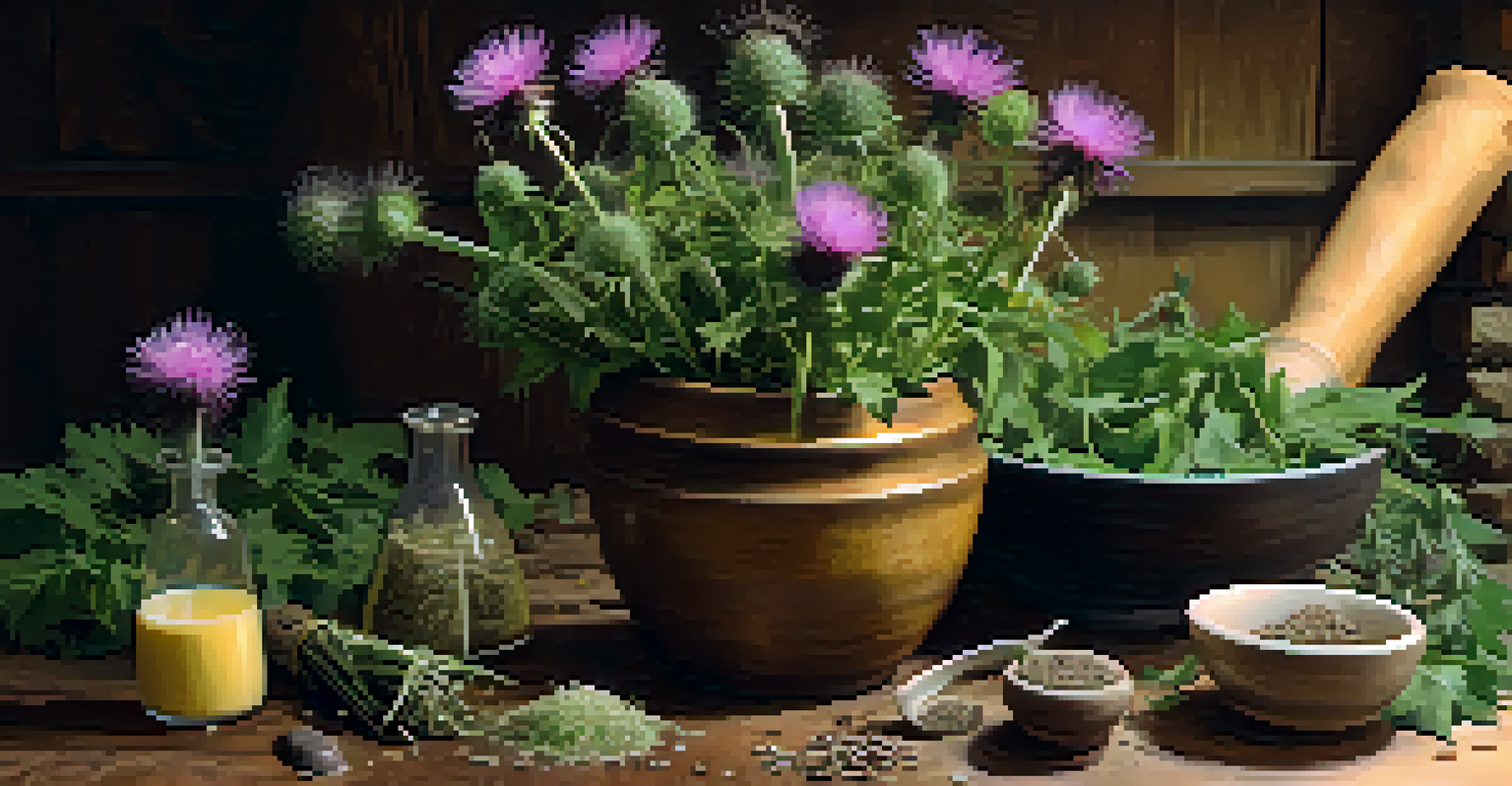Detoxification Methods in Naturopathy and Traditional Chinese Medicine

Understanding Detoxification in Naturopathy
Detoxification in naturopathy focuses on supporting the body's natural ability to eliminate toxins. Practitioners believe that by enhancing this process, individuals can achieve better health and well-being. This approach often includes dietary changes, herbal remedies, and lifestyle adjustments tailored to individual needs.
Detoxification is a process of cleansing the body of toxins, impurities, and waste products. It is an essential part of the healing process.
Naturopaths often emphasize the importance of whole foods, encouraging a diet rich in fruits, vegetables, and grains. These foods are believed to contain essential nutrients that support detoxification processes. Additionally, they may suggest eliminating processed foods, sugars, and alcohol to reduce the intake of harmful substances.
Hydration is another critical aspect of detoxification in naturopathy. Drinking plenty of water helps flush out toxins and supports kidney function. Many practitioners also recommend herbal teas and broths that can enhance detoxification and provide additional nutrients.
Key Detoxification Methods in Naturopathy
Naturopathy employs several methods for detoxification, including colon cleanses, fasting, and detox diets. Colon cleanses aim to remove waste and toxins from the digestive system, potentially improving overall health. Fasting, under professional supervision, can give the body a break from digestion, allowing it to focus on healing.

Detox diets are another popular method, often involving a period of consuming specific foods or liquids designed to assist the body in eliminating toxins. These diets may include juices, smoothies, or specific food combinations intended to support the liver and other detoxifying organs.
Detoxification Supports Natural Healing
Naturopathy enhances the body's ability to eliminate toxins through dietary changes, hydration, and lifestyle adjustments.
Moreover, naturopathy promotes regular exercise as a vital part of the detox process. Physical activity increases blood circulation and lymphatic drainage, which can help remove toxins from the body. Combining exercise with other detox methods can enhance their effectiveness and contribute to overall wellness.
Principles of Detoxification in Traditional Chinese Medicine
In Traditional Chinese Medicine (TCM), detoxification is rooted in the concept of balancing the body's energies, known as Qi. TCM practitioners believe that stagnation of Qi can lead to health issues, so detoxification aims to restore this balance. Techniques often include acupuncture, herbal medicine, and dietary changes.
The body is a self-healing organism, and detoxification is one of its most vital functions.
Acupuncture is used in TCM to stimulate specific points on the body, promoting the flow of Qi and enhancing detoxification. This method can help alleviate symptoms associated with toxin buildup, such as fatigue or digestive issues. By restoring energy flow, acupuncture supports overall health and vitality.
Herbal remedies play a significant role in TCM detoxification strategies. Practitioners often recommend specific herbs that are believed to cleanse the body and support organ function, especially the liver and kidneys. These herbal formulas can be tailored to individual needs, creating a personalized approach to detoxification.
Common Herbal Remedies in Naturopathy
Herbs are a cornerstone of naturopathic detoxification, with several known for their cleansing properties. Milk thistle, for example, is renowned for its ability to support liver health and detoxification. This herb contains silymarin, which is thought to protect liver cells and promote regeneration.
Another popular herb is dandelion, often used in detox teas. Dandelion is believed to enhance liver function and aid digestion, making it a valuable ally during detoxification. Its leaves can be consumed in salads or as a herbal infusion, adding both flavor and health benefits.
Herbs Play a Key Role in Detox
Popular herbs like milk thistle and dandelion are known for their cleansing properties and support of liver health.
Additionally, burdock root is commonly used for its blood-purifying properties. This herb is thought to assist in eliminating toxins from the bloodstream, promoting clearer skin and better overall health. Incorporating these herbs into a detox regimen can enhance the body's natural cleansing processes.
Techniques for Detoxification in Traditional Chinese Medicine
TCM incorporates various techniques for detoxification, including cupping and moxibustion. Cupping involves creating suction on the skin, which can help release toxins and improve circulation. This technique is particularly popular among athletes for muscle recovery and overall wellness.
Moxibustion, another TCM technique, involves burning mugwort herb near acupuncture points. This process is believed to warm and invigorate the flow of Qi, assisting the body's natural detoxification capabilities. By enhancing energy flow, moxibustion can help alleviate symptoms of stagnation.
Dietary therapy is also pivotal in TCM detoxification. Practitioners often recommend foods that are believed to support liver health, such as leafy greens, legumes, and whole grains. These dietary suggestions align with the TCM philosophy of maintaining balance and harmony within the body.
Lifestyle Changes to Enhance Detoxification
Both naturopathy and TCM stress the importance of lifestyle changes in supporting detoxification. Stress management, for instance, is crucial, as high stress levels can hinder the body's ability to eliminate toxins. Techniques such as meditation, yoga, or deep breathing can help maintain a balanced state of mind.
Sleep is another vital component of detoxification. During sleep, the body undergoes critical repair processes and detoxification, particularly in the brain. Prioritizing quality sleep can significantly enhance the effectiveness of any detox regimen, allowing the body to rejuvenate.
Lifestyle Changes Enhance Detox Processes
Incorporating stress management, quality sleep, and reducing exposure to environmental toxins are vital for effective detoxification.
Finally, reducing exposure to environmental toxins is essential. This includes avoiding harmful chemicals in household products, opting for natural alternatives, and being mindful of food sources. Making these conscious choices supports the body's detoxification processes and promotes long-term health.
Conclusion: Choosing Your Detoxification Path
When considering detoxification methods, it's essential to choose an approach that resonates with you. Whether you lean towards naturopathy or Traditional Chinese Medicine, understanding the principles and techniques involved can empower you in your health journey. Each method offers unique insights and practices to support your body's natural detox processes.
Consulting with a qualified practitioner can provide personalized guidance tailored to your specific needs and health goals. They can help you navigate the myriad options available and create a plan that aligns with your lifestyle and preferences.

Ultimately, the goal of detoxification is not just to cleanse the body but to foster a deeper connection with your health. Embracing these holistic practices can lead to a more vibrant and balanced life, allowing you to thrive in your well-being.